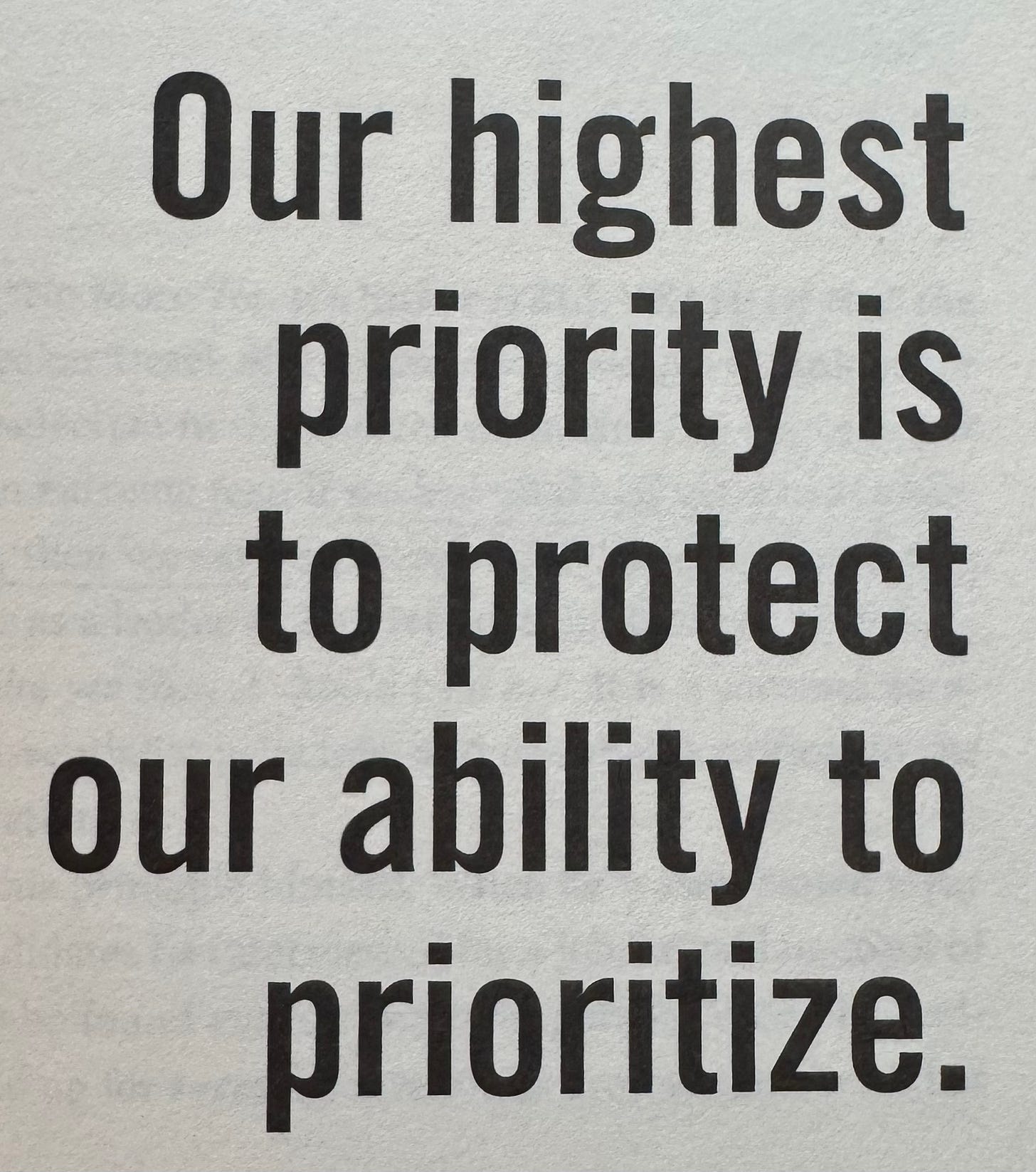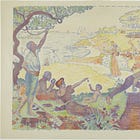I know several of you have read and loved 4,000 Weeks by Oliver Burkeman— the iconic book about building a productive, meaningful, and joyful life within the (on average) 4,000 weeks we are allotted. It is rightfully a cult classic, putting into perspective this painful truth: “We’ve been granted the mental capacities to make almost infinitely ambitious plans, yet practically no time at all to put them into action.”
I have another book to add to the time management canon: Essentialism: The Disciplined Pursuit of Less by Greg McKeown.
If 4,000 Weeks is a permission slip to stop worrying about our short time on Earth, Essentialism tells us how to capitalize on that small amount of time.
You know this to be true: If you don’t prioritize your life, someone else will.
But does your life reflect it? How often do you ask yourself if you’re investing in the right activities? If you’re prioritizing the essential and deprioritizing the unessential?
Now is a good time to direct your focus to what is truly essential.
The way of the Essentialist rejects the idea that we can fit it all in. Instead it requires us to grapple with real trade-offs and make tough decisions.
Like Oliver Burkeman in 4,000 Weeks, Greg McKeown is candid about our inability to do everything we want to do, no matter how productive we are. What we must do, then, is prioritize. That’s where Essentialism comes in. It’s not about getting more done, it’s about getting the right things done. The thinking behind this is that by investing in fewer things, we can make more significant progress in those which matter most.
The way of the Essentialist means living by design, not by default.
Consider this: The word priority entered the English language in the 1400s. It meant the very first or prior thing. It remained priority for five hundred years, until we pluralized the word, giving ourselves priorities.
It’s true we all have a lot of demands on our time and attention and therefore have multiple priorities. But if everything is your priority, nothing is your priority. The discipline of Essentialism helps you understand what is most important to you and how to eliminate the rest.
When we forget our ability to choose, we learn to be helpless.
McKeown shares a quote I love by John Maxwell: “You cannot overestimate the unimportance of practically everything.”
So how do we know what’s important and what’s not?
Naturally, that’s what the book is about, but I’ve distilled some of McKeown’s methods below so you can begin to prioritize even if reading this book isn’t your priority.
Step one: Explore
The first step is to find out what matters to you. McKeown says that if we feel a total conviction to do something, then we say yes; “anything less gets a thumbs down.”
If you are unsure whether your conviction is total or not, try this:
90 Percent Rule
McKeown recommends you run every decision you make through a test. “As you evaluate an option,” he says, “think about the single most important criterion for that decision, and then give the option a score of between 0 and 100.”
Anything lower than 90 gets cut.
Getting hyper-specific with your decision making helps you make decisions that are in line with what really matters to you. Assigning numerical values like the 90 Percent Rule forces us to make decisions “consciously, logically, and rationally, rather than impulsively or emotionally.”
In other words, it helps us discern what is essential and, perhaps more importantly, what’s not. Once you decide what isn’t essential to you, it’s time to eliminate.
Step two: Eliminate
I will preface this by saying all of this is easier said than done. But once you begin eliminating the unessential, it does get easier. This is something I’ve been working on since first reading the book in 2016. The reason I’m revisiting it now is because, though I know much of what is essential to me, I still find myself doing the inessential, such as scrolling through social media or engaging in text messages with friends that are fun but not essential.
A good question to ask yourself is the following:
“If I didn’t have this opportunity, what would I be willing to do to acquire it?”
If I wasn’t able to scroll through Instagram, how far would I go to be able to? Not far, as it turns out.
Another, simpler question is: What will I say no to? Is it absolutely necessary to travel for a work meeting? Will my friends disown me if I don’t go to dinner with them tonight?
McKeown says it straight: “Either we can say no and regret it for a few minutes, or we can say yes and regret it for days, weeks, months, or even years.” When you decide what you’re willing to say no to, it will uncover your true priorities and reveal the best path forward.
“The right “no” spoken at the right time can change the course of history.”
Saying no to social outings may sound wrong, and it requires a certain emotional discipline to get comfortable doing so. (I’m not awesome at this, by the way.) But you know when you do something because you feel obligated to? If it’s not a hell yes, for the Essentialist, it’s a hell no (not that you need to say that to your friends).
In his time saying no, McKeown has learned it’s “almost universally true that people respect and admire those with the courage of conviction to say no.”
Yes, maintaining relationships is important, but missing out on a dinner so you can hang out with your child or spend two uninterrupted hours working on your novel — that is essential.
Step three: Execute
McKeown quotes Victor Hugo as saying,“Nothing is more powerful than an idea whose time has come.” He adds that “less but better” is a principle whose time has come.
To do less but better, Essentialists start small and celebrate progress. “Instead of going for the big, flashy wins that don’t really matter, the Essentialist pursues small and simple wins in areas that are essential.”
Progress is the most effective form of human motivation. When frequently making progress toward small achievements, you will feel more motivated to keep going. And we keep going by saying yes to things we give a score of 90+ to, and we say no to the rest.
Whatever decision or challenge or crossroads you face in your life, simply ask yourself, “What is essential?” Eliminate everything else.
McKeown argues that only once we stop trying to do it all and stop saying yes to everyone, can we make our highest contribution toward the things that really matter.
Are you ready to determine what matters to you and say no to everything else? It’s essential to living a meaningful life.
For more reading on the importance of doing only what is essential, here are some recommendations:
Tell me: Do you do only that which is essential? Might you consider trying to in the new year? Thank you for reading; I’d argue reading about Essentialism is essential.
What are you reading? What I’m reading: All the Colors of the Dark by Chris Whitaker
Love,
When you purchase books through my links, you support Words on Words (I get credits for more books) and an indie bookstore of your choice at no additional cost to you.










I agree, Essentialism is such a helpful book/concept! The first thing that comes to mind when I think of it is a line you shared: "If you don’t prioritize your life, someone else will." Another book I appreciate in this area is The One Thing by Gary Keller and Jay Papasan - a pretty quick read and potential game-changer as well. Thank you for the thoughtful overview and great points!
Ya know, I was thinking maybe I needed to read this book, and as I read your essay on it, I realized I do most of these things, so I guess I'm an "essentialist." I have always been really good at saying "No" to things that I know I won't want to do. And when I have done things I knew I didn't want to do, I've always come away saying, "I was right. I shouldn't have done that." I still might read the book because it sounds like there is a lot I could still glean from it.